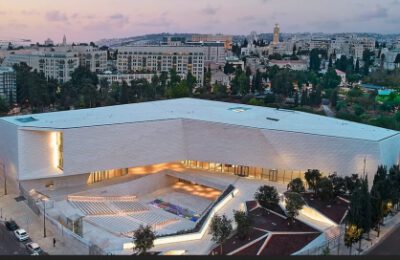JERUSALEM — As quiet descended on southern Israel on Monday morning, Aug. 8, after a ceasefire came into effect Sunday night, Israel’s achievements in its 55-hour Operation Breaking Dawn against Islamic Jihad in the Gaza Strip became clear.

Smoke rises in Gaza, Aug. 6, amid Operation ‘Breaking Dawn.’ (Majdi Fathi/TPS)
• A “ticking bomb,” an imminent terrorist attack by Islamic Jihad, was averted.
• The entire upper echelon of Islamic Jihad’s security apparatus was killed.
• Seventeen rocket production centers of Islamic Jihad — most of its capacity — were destroyed.
• At least some of Islamic Jihad’s supply chain of Iranian rocket-making parts was destroyed. The parts passed through Egypt from Iran.
• Israel drove a wedge between the two Gaza terrorist organizations, Islamic Jihad and Hamas. Hamas stayed out of the fight this time, apparently due to Israel’s policy of issuing 14,000 work permits to Gazans.
This enabled them to support their families, mitigating their antagonism to Hamas; and enabled Hamas to concentrate on rebuilding Gaza and its own military appartus, which took a major hit in the 11 day war that Hamas launched against Israel in May, 2021.
• Egypt’s close cooperation with Israel in achieving a ceasefire illustrated Israel’s growing acceptance in the Arab world and the continued decrease of Palestinian influence. Of the four Arab states who made peace with Israel under the 2020 Abraham Accords, three said nothing about Israel’s operation, and one issued a condemnation.
• Israel’s operation pointed out that Hamas’s characterization in 2021 of Israeli police work to maintain peace on the Temple Mount as an attack on Islamic holy places was a cover for war. On Sunday, Aug. 7, 2022, Israeli police were active on the Temple Mount on Tisha b’Av, controlling Israeli crowds there. Hamas said and did nothing.
Israel thanked Egypt for its mediation efforts in achieving a ceasefire. If the ceasefire is violated, Israel articulated its right to respond strongly.
The counterterrorism operation saw Islamic Jihad terrorists in Gaza launching about 1,000 rockets at Israel, including at Tel Aviv and the Jerusalem area, sending millions of Israelis to seek shelter.
About 97% of the missiles were intercepted by the Iron Dome defense batteries.
About 200 of them fell short and landed in the Gaza strip itself, killing at least 15 Gazans [see story nearby].
Gazans were outraged at the Islamic Jihad killling Gazans, including children.
Dozens of Israelis were treated by emergency medical teams for light injuries incurred while running for shelter and for shock.
One Arab from Hebron was moderately injured Aug. 7 from rocket shrapnel in the Ashkelon area.
A resident of Ashkelon, Shlomo Atias, 60, had a heart attack and collapsed on Aug. 8 while running for cover. He died in the hospital.
The Israeli Air Force conducted dozens of strikes, killing senior Islamic Jihad terrorists and hitting terror cells, and striking at some 165 terror targets, including rocket launchers and weapons caches.
Taysir al-Jabari, commander of the Islamic Jihad’s northern division, was killed on Friday, Aug. 5.
The commander of the southern division, Khaled Mansour, was killed on Saturday night, Aug. 6.
Khatab ‘Amasi, Islamic Jihad’s commanding officer of the Rafah Brigade, and Ziad Madalal, Mansour’s deputy, were also killed in the strikes.
According to the IDF’s data, 35 Gazans were killed by IDF fire during the operation, 11 of whom were uninvolved.
The Israel Air Force’s final strike, which lasted three to four minutes, hit three military depots, launch pits, headquarters of the Islamic Jihad and other targets.
The IDF’s Home Front eased most of the restrictions imposed on the citizens in the south on Aug. 8 and reopened the crossing between Israel and Gaza.
Israel did not agree to the release of any of the detainees demanded by the Islamic Jihad, neither the administrative detainee nor the one who was arrested last week, a Jerusalem official clarified Aug. 8.
Ahead of the ceasefire, Islamic Jihad leadership demanded the release of several prisoners held by Israel, including Sheikh Bassam al-Saadi, the leader of the Islamic Jihad in the West Bank, arrested last week, who was the alleged reason for the terror organization’s threats against Israel that led to the operation.
Although Egypt, who mediated between Israel and the Islamic Jihad and facilitated the ceasefire, asked to hear about the situation of the detainees, it did not say that Israel would release them, “and we did not agree to that,” a source told TPS.
Egypt had told Islamic Jihad that it would make an effort to release the administrative prisoner Khalil Al-Awaweda for medical treatment and to work for the release of al-Saadi.
Hillel Goldberg contributed to this article.
















